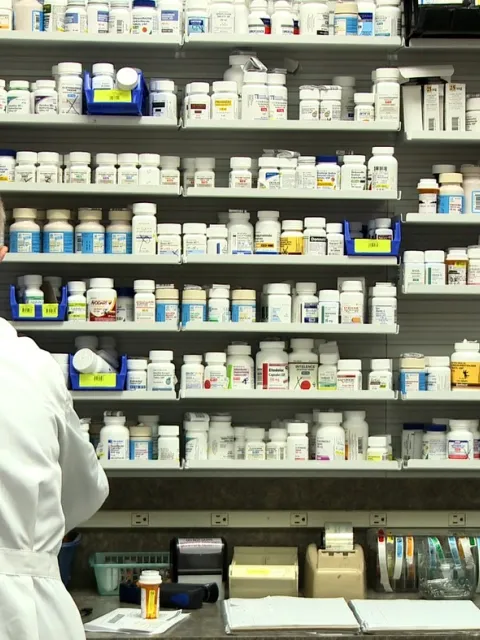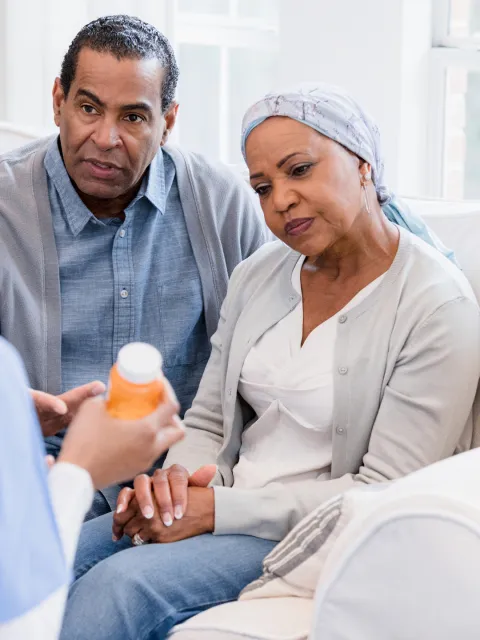Cancer treatment threatened by increasingly ineffective antimicrobial drugs
As pathogens become ever more resistant to antimicrobial drugs such as antibiotics, people living with cancer run a growing risk of adverse treatment outcomes, including death from an infection, even though their cancer is treatable.

Key Messages
- As many as 1 in 5 cancer patients undergoing treatment are hospitalised due to infection, and antibiotics are the main line of defence.
- A significant drop in the efficiency of antimicrobial drugs due to overuse and other factors could lead to an increase infections and death for cancer patients.
- UICC is collaborating with its network and partners to increase awareness and knowledge about the threat of AMR, including the issue of access to quality-assured medicines and diagnostics.
Register for Virtual Dialogue on AMR, 31st May
This Virtual Dialogue Discussions on 31st May will focus on the need to increase awareness on AMR as a key issue for global health, especially among health care workers within cancer care.
The growing resistance of certain pathogens to medicines intended to treat the infections that they cause is a major threat to public health. An estimated 1,2 million people die annually from drug-resistant infections and by 2050 this number could reach ten million and cost more than USD 100 trillion without collective action. People with cancer are particularly vulnerable, as antimicrobial resistance or AMR threatens the viability of their treatment and even their very survival.
Infections are one of the most common complications that a person living with cancer faces. As many as 1 in 5 cancer patients undergoing treatment are hospitalised due to infection, and antibiotics are the main line of defence.
In the case of blood cancers, important immune cells can be affected, and with solid tumours numerous factors contribute to an increased risk of infection, including obstructions caused by the tumour itself and the disruption of natural barriers such as skin and mucosal membranes. Treatments, such as chemotherapy and surgery and, to a lesser extent, radiotherapy can also impair the body’s ability to fight infection. Cancer patients also often become neutropenic, which means the concentration in the blood of white blood cells that help fight infections (neutrophils) becomes too low and the body struggles to fend off infections.
Finally, the use of medical devices like catheters or shunts also increase a patient’s exposure to infection. For these reasons, people living with cancer have a higher-than-average risk of being infected by drug-resistant bacteria (with an estimated one in five cancer patients requiring antibiotics in the course of their treatment) and also face increased risks when the medicines used to fight infection are ineffective. These can range from delayed treatment to death – 8.5% of cancer deaths are estimated to be caused by sepsis.
A study on AMR in the US estimates that a 30% reduction in the efficiency of antibiotics used for cancer patients (in relation to surgery or chemotherapy) would cause an additional 120,000 infections and 6,300 deaths each year.
“Antibiotics are essential to prevent and treat infections in people being treated for cancer. Without effective antibiotics at hand, cancer treatment is nearly impossible. As economic and political momentum lags behind, we need a dramatic shift in public awareness of the risks they face - only by mass mobilisation of the public can we drive change from the ground up.”
– Dr. Abdul Ghafur, consultant and Adjunct Professor in infectious diseases and clinical microbiology at the Apollo Hospitals, Chennai, India in ”Effectiveness of cancer treatments threatened by rising antibiotic resistance”
According to the Longitude Prize report published in February 2020 entitled “Effectiveness of cancer treatments threatened by rising antibiotic resistance”, 95 out of 100 oncologists surveyed in the UK are concerned about the rise of drug-resistant bacteria and more than three quarters think that drug-resistant infections will make some cancer treatments obsolete within the next five to 20 years.
Overuse of antibiotics has contributed to the problem, but also the report states that there is the need for greater knowledge and understanding about the characteristics of drug-resistant bacteria.
Another important area of focus is the availability, affordability and sustained access to quality-assured medicines and diagnostics. This also includes R&D for new medicines and diagnostics, as no new types of antibiotics have been discovered since the 1980s. However, incentives for the pharmaceutical industry to invest in antibiotics are declining. In fact, many large pharmaceutical companies have dropped antibiotics from their portfolios due to the unfavourable return on investment.
Access to diagnostics go hand in hand with access to medicines. Therefore, according to the Longitude Prize report, the research and development of “affordable, easy-to-use tests that will rapidly and accurately diagnose bacterial infections” need to be scaled up urgently. Robust clinical guidelines, improved infection control and prevention are also required for better management of AMR.
“Diagnostics and innovative testing are essential in the fight against drug resistance. They are important in identifying resistant bacteria so infection prevention measures can be enacted in hospital settings. They also allow for a more targeted application of antibiotics, reducing overuse and allowing practitioners to determine the most appropriate course of treatment.”
– Adam Zerda, Director, AMR Strategy and Development, BD (Becton, Dickinson, and Co.)
While there is momentum in the right direction, more needs to be done. There is a strong push from governments (such as the UK’s Global AMR Innovation Fund or GAMRIF, which supports R&D), initiatives like CARB-X and the Global Antibiotic Research and Development Partnership (GARDP), and the AMR Action Fund supported by the pharmaceutical industry. However, sustained investment and more collaborative approaches are needed to address the increased need for R&D of new antimicrobials and diagnostics.
ReAct is an international independent network initiated in 2005 to act as a global catalyst and advocate for global engagement on antibiotic resistance. The organisation issued last year a policy brief about the links connecting effective antibiotics and cancer care, and why urgent action on microbial resistance is needed and how cancer societies could be important actors of change. In this race against AMR, the global health community must come together and find solutions quickly in a collaborative manner. Everyone has a part to play.
UICC supports a call for action on antimicrobial resistance
AMR is one UICC’s key thematic areas of work. In addition to providing an overview of the importance of AMR in cancer care and for patient outcomes, with access to news, expert blogs and additional resources, UICC organises a number of Virtual Dialogues to raise awareness and increase knowledge amongst its members and wider cancer community.
Last year, a first Virtual Dialogue looked at what could be done to fight the threat of antibiotic resistance for effective cancer treatments. This year on 31st May, a new Virtual Dialogue on AMR will focus specifically on the important role of health care personnel in addressing AMR.
UICC was also actively involved last year in bringing AMR into the global spotlight at the London Global Cancer Week 2020, where it hosted a panel event with the Wellcome Trust, which included as Dame Sally Davies, UK Special Envoy on Antimicrobial Resistance and Abdul Ghafur, Consultant and Adjunct Associate Professor in Infectious Diseases and Clinical Microbiology at the Apollo Hospitals in India. A full recording of the event is available for viewing.
UICC will again be present this year at the London Cancer Global Week 2021 to talk about AMR. The event will take place on 18th November and focus on the need for more treatments: “How do we ensure global access to the right treatment at the right time to address AMR. Date – 18th of Nov 2021. UICC will be further invested in the World Antimicrobial Awareness Week, which also takes place in November.
Crucially, UICC supported the launch of a global call to action on AMR by WHO, UNEP and other UN agencies, as well as civil society actors, the private sector, academia and research institutions. The aim is to build on lessons learned from the COVID-19 pandemic and address the “silent tsunami” of AMR and deliver on the 2030 Agenda for Sustainable Development by strengthening coordination and multisectoral actions, building awareness and understanding, encouraging national AMR action plans, and supporting and accelerating the implementation of previous commitments and new recommendations to tackle AMR.
“AMR could, potentially, cause the next pandemic. Sally Davies, the UK’s special envoy on AMR, captures the difference between that hypothetical pandemic, and the one that’s buffeting us now, in a vivid metaphor: ‘Covid’s a lobster dropped into boiling water, making a lot of noise as it expires, whereas AMR is a lobster put into cold water, heating up slowly, not making any noise.’ Those who study AMR warn the water is pretty hot.”
– Laura Spinney, science journalist and author, “The next pandemic? It may already be upon us”, The Guardian, 15th February 2021
Last update
Tuesday 21 May 2024
